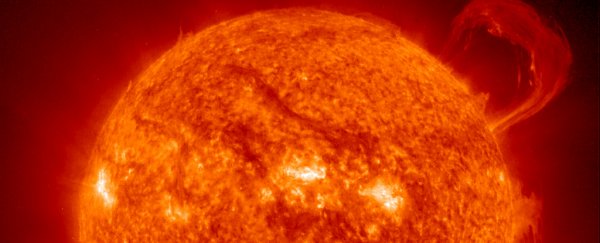Astronomers think they might have finally solved the mystery of how and why the Sun's rotation is slowing down.
The Sun, on average, rotates on its axis roughly once per month, but two decades ago, scientists made the baffling discovery that its outer 5 percent spins more slowly than the rest of its interior. And a new study might have finally figured out why.
"The Sun won't stop spinning anytime soon, but we've discovered that the same solar radiation that heats the Earth is 'braking' the Sun, because of Einstein's Special Relativity, causing it to gradually slow down, starting from its surface," writes lead researcher Jeff Kuhn from the Institute for Astronomy, University of Hawaii.
The Sun doesn't spin as a solid mass like Earth does - instead, its parts rotate at different rates depending on their latitude and how far they are from the centre of the Sun. So the poles will spin at a different rate to the equator.
That's something we've known for a long time, but what scientists couldn't figure out was why the outer 5 percent of the Sun was rotating slower compared to its interior.
To figure out what was going on, the team looked at 3.5 years of data from NASA's Solar Dynamics Observatory satellite, which has been observing the Sun since 2010.
Their data was taken from the Helioseismic and Magnetic Imager, which looks at solar oscillations in the Sun's magnetic field.
They noticed that there had been a sharp slow-down in the Sun's rotation rate in its very outer 150 km layer, which they predict is due to something called the photon-braking effect.
The team predicts that this braking effect is similar to something called the Poynting-Robertson effect, which is a process by which solar radiation causes a dust grain orbiting a star to lose angular momentum and slow down.
They suggest that same effect also acts like a brake on the rotation of the outer area of the Sun, and might also be in play around other stars in the Universe.
"This is a gentle torque that is slowing it down, but over the Sun's 5 billion year lifetime it has had a very noticeable influence on its outer 35,000 km," said Kuhn.
The big question now is how this slowing rotation at the Sun's surface affects the solar magnetic field, which is what controls the solar flares that blast off the Sun and can affect Earth's telecommunications.
That's something the researchers hope to work on in future, but at least we now finally have a good idea about why the Sun's spin is slowing down.
The research has been accepted for an upcoming edition of Physical Review Letters, and you can read it in full at arXiv.org.
